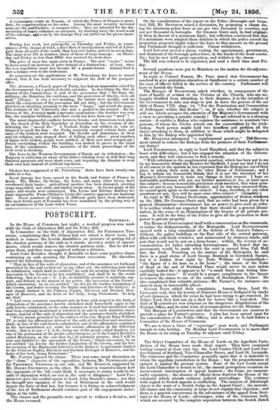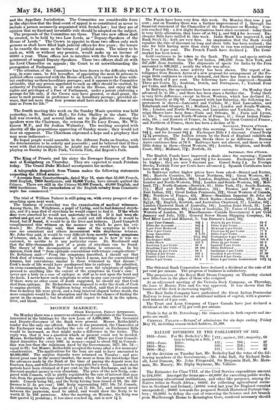The Select Committee of the House of Lords on the
Appellate Juris- diction of the House have made their report. - They have examined leading counsel at their own bar, the. Lord Justice Clerk and Lord Jus- tice-General of Scotland, Vice-Chancellor Stuart, and Lord St. Leonard's. The witnesses and the Committee generally agree that it is desirable to retain the appellate jurisdiction in the House ; but the preponderance of opinion is against the present system. None of the Law Lords except the Lord Chancellor is bound to sit ; the annual prorogation occasions an inconvenient interruption of appeal business ; the forms are unneces- sarily expensive ; the absence of official dress deprives the House of the solemnity which attends ordinary judicial proceedinge. The evidence with regard to Scotch appeals is conflicting. The lawyers of Edinburgh object to the want of a Scotch Judge in the Appeal Court ; the mercan- tile classes and the community at large do not express that objection ; and there is a general concurrence in the advantages of the appeal front Scot- land to the House of Lords ; advantages, some of the witnesses hold, which are secured by the complete separation between the Scotch Bench and the Appellate Jurisdiction. The Committee see considerable force in the objection that the final court of appeal is so constituted as never to include a person necessarily acquainted with Scotch law • but they are of opinion that no fixed and invariable rule should be adopted on the subject.
The proposals of the Committee are these. That two new offices shall be created, to be held by two Law Lords, as " Deputy-Speakers of the House of Lords." The Crown to appoint to those two offices only such persons as shall have filled high judicial offices for five years ; the tenure to be exactly the same as the tenure of judicial seats. The salary to be such as, with or without any pension, would make up an income of 60001. a year. These offices not to interfere with the Crown in the ap- pointment of unpaid Deputy-Speakers. These two officers shall sit with the Lord Chancellor on appeals ; the Court to sit notwithstanding the prorogation of Parliament.
"The attention of the Committee has been drawn to the difficulty which may,in sonic cases, be felt hereafter, of appointing the most fit persons to judicial effices connected with the House of Lords, if it cannot be done with- out conferring on them hereditiuy peerages ; and it appears to the Committee advisable, that any person appointed to such an office should be enabled, by authority of Parliament, to sit and vote in the House, and enjoy all the rights and privileges of a Peer of Parliament, under a patent conferring a peerage for life only, if the Crown may have granted, or shall grant, the same to such persons in preference to an hereditary peerage ;_provided al- ways, that not more than four persons shall have seats in the House at one time as Peers for life."



































 Previous page
Previous page